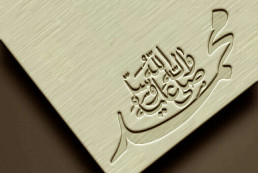 Rasulullah (sallallahu ‘alaihi wasallam)’s mubaarak conduct with his close attendant
Rasulullah (sallallahu ‘alaihi wasallam)’s mubaarak conduct with his close attendant
عن أنس بن مالك قال: خدمت رسول الله صلى الله عليه وسلم عشر سنين فما قال لي أف قط وما قال لي لشيء صنعته لم صنعته ولا لشيء تركته لم تركته وكان رسول الله صلى الله عليه وسلم من أحسن الناس خلقا ولا مسست خزا ولا حريرا ولا شيئا كان ألين من كف رسول الله صلى الله عليه وسلم ولا شممت مسكا قط ولا عطرا كان أطيب من عرق رسول الله صلى الله عليه وسلم (الشمائل المحمدية للترمذي رقم: 328)
Translation
Hazrat Anas (radhiyallahu ‘anhu) reports, “I remained in the service of Rasulullah (sallallahu ‘alaihi wasallam) for ten years. (During the entire ten years,) He (sallallahu ‘alaihi wasallam) never ever (reprimanded me and) said “Oof!” to me, nor did he ever say to me regarding any specific action which I had done, “Why did you do such-and-such an action?” nor (did he ever say to me) regarding any specific action that I had not done, “Why did you not do such-and-such an action?” And from all of mankind, Rasulullah (sallallahu ‘alaihi wasallam) had the best character. I never touched any cloth that was made of silk and another material, nor a cloth made of pure silk, nor have I touched any other substance that was more smooth (and gentle) than the blessed palm of Rasulullah (sallallahu ‘alaihi wasallam), and I never smelt any musk or any other perfume that was more fragrant (and sweet) than the blessed perspiration of Rasulullah (sallallahu ‘alaihi wasallam).”
Commentary:
In this Hadith, Hazrat Anas (radhiyallahu ‘anhu) explains the beautiful and noble akhlaaq (character) of Rasulullah (sallallahu ‘alaihi wasallam). He served the Master (sallallahu ‘alaihi wasallam) for approximately ten years, until the end of Rasulullah’s (sallallahu ‘alaihi wasallam) life.
It is reported that when Hazrat Rasulullah (sallallahu ‘alaihi wasallam) made Hijrah to Madinah Munawwarah, Hazrat Ummu Sulaim (radhiyallahu ‘anha) held the hand of her young son, Hazrat Anas (radhiyallahu ‘anhu), and took him to Rasulullah (sallallahu ‘alaihi wasallam) saying, “O Rasul of Allah (sallallahu ‘alaihi wasallam)! This is my son, Anas (radhiyallahu ‘anhu). I have brought him to serve you.” Hazrat Rasulullah (sallallahu ‘alaihi wasallam) accepted Hazrat Anas (radhiyallahu ‘anhu) in his service. (Isaabah#277)
Hazrat Anas (radhiyallahu ‘anhu) says, “During the ten years in which I served Rasulullah (sallallahu ‘alaihi wasallam), he never ever told me ‘Oof’, nor reproached me for something which I had done, nor rebuked me for something which I had not done.” In this way, Hazrat Anas (radhiyallahu ‘anhu) explained the sublime and noble character of Rasulullah (sallallahu ‘alaihi wasallam).
Rasulullah (sallallahu ‘alaihi wasallam) conducting in this manner was on account of his high level of humility and noble character. Similarly, this was also on account of Rasulullah (sallallahu ‘alaihi wasallam) being pleased with the decree of Allah Ta‘ala at all times. Hazrat Sheikh Moulana Muhammed Zakariyya (rahimahullah) mentioned that this is the essence of ‘Radha bil Qadha” (being content with the decree of Allah Ta‘ala in all conditions) according to the Sufis.
In certain Ahaadith, Hazrat Anas (radhiyallahu ‘anhu) mentioned that if he made a mistake and his family members reproached him, Rasulullah (sallallahu ‘alaihi wasallam) would immediately say to them, “Do not scold him, as whatever was written in taqdeer has come to pass.” (Mishkaat #5819)
Hazrat Mulla Ali Qaari (rahimahullah), the famous commentator of Hadith, explained that Rasulullah (sallallahu ‘alaihi wasallam) remaining silent and not correcting Hazrat Anas (radhiyallahu ‘anhu) was in relation to worldly affairs or matters pertaining to his personal rights. Rasulullah (sallallahu ‘alaihi wasallam), on account of his compassionate and tolerant nature, would overlook his mistakes and would not take him to task. This Hadith does not refer to his mistakes in aspects of deen. In deeni matters, Rasulullah (sallallahu ‘alaihi wasallam) would not remain silent, but would correct a person as this pertains to the rights of Allah Ta‘ala.[1]
Hazrat Aaishah (radhiyallahu ‘anha) mentioned, “Rasulullah (sallallahu ‘alaihi wasallam) never took revenge for himself, but if any command of Allah Ta‘ala was violated (i.e. a haraam deed was committed), then he surely disciplined or punished the evil doer.” (Saheeh Bukhaari #3560)
In another Hadith, Hazrat Anas (radhiyallahu ‘anhu) explained the beautiful character and tolerance of Rasulullah (sallallahu ‘alaihi wasallam) in the following words. He said, “On one occasion, Rasulullah (sallallahu ‘alaihi wasallam) asked me to fulfill an errand. I responded saying, “I will not go,” although in my heart, I intended to go. Thereafter, I set out to fulfill the work which Rasulullah (sallallahu ‘alaihi wasallam) asked me to do. While proceeding, I saw some children playing and I became distracted and joined them. After some while, Rasulullah (sallallahu ‘alaihi wasallam) came behind me and held my nape in a loving manner. When I looked behind, then to my surprise, I found that it was Rasulullah (sallallahu ‘alaihi wasallam) holding me. Rasulullah (sallallahu ‘alaihi wasallam) smiled at me, and in a loving tone asked me, “O Unais (a title of affection for Hazrat Anas (radhiyallahu ‘anhu))! Did you go where I sent you?” I replied, “Yes, I am going now, O Rasul of Allah (sallallahu ‘alaihi wasallam)!” (Saheeh Muslim #2310)
Being a child of tender age, Hazrat Anas (radhiyallahu ‘anhu) conducted in the manner he conducted. However, Rasulullah (sallallahu ‘alaihi wasallam) overlooked his playfulness and showed him love and affection and did not reprimand him nor scold him.
Hazrat Anas (radhiyallahu ‘anhu) mentioned, “I had never touched anything that was more smooth (and gentle) than the blessed palm of Rasulullah (sallallahu ‘alaihi wasallam).” Other Ahaadith describe Rasulullah (sallallahu ‘alaihi wasallam) as having a strong palm, which is a sign of physical strength and perfection. Hence, we understand from both these Ahaadith that the blessed palm of Rasulullah (sallallahu ‘alaihi wasallam) was strong, yet the skin on his blessed palm was smooth and gentle in texture.
In this Hadith, Hazrat Anas (radhiyallahu ‘anhu) described the blessed perspiration of Rasulullah (sallallahu ‘alaihi wasallam) as being more fragrant than all the fragrances and perfumes of the world. Hazrat Sheikh Moulana Muhammed Zakariyya (rahimahullah) mentioned that if a person shook hands with Rasulullah (sallallahu ‘alaihi wasallam), then on account of his hands touching the blessed hands of Rasulullah (sallallahu ‘alaihi wasallam), his hands would be fragrant for the entire day. It is recorded in certain narrations that the perspiration of Hazrat Rasulullah (sallallahu ‘alaihi wasallam) would be collected by certain Sahaabah and used as a fragrance.
A point worthy of note is that despite Rasulullah (sallallahu ‘alaihi wasallam) not needing to apply perfume – as the fragrance which naturally emanated from his blessed body surpassed the sweetness of all fragrances – he (sallallahu ‘alaihi wasallam) would still apply ‘Itr in order to teach the Ummah the aspect of cleanliness and purity.
An interesting incident
Hazrat Sheikh Moulana Muhammed Zakariyya (rahimahullah) mentioned:
There is an interesting incident regarding the last portion of the Hadith under discussion, which proves the complete love which the Sahaabah (radhiyallahu ‘anhum) possessed for Rasulullah (sallallahu ‘alaihi wasallam). The incident is as follows:
Once, Hazrat Anas (radhiyallahu ‘anhu) mentioned with deep love and happiness, “I had made musaafahah and touched the mubaarak hands of Rasulullah (sallallahu ‘alaihi wasallam) with these hands of mine. I did not feel any silken cloth or pure silk softer than the mubaarak hands of Rasulullah (sallallahu ‘alaihi wasallam).” The student before whom this Hadith was mentioned exclaimed with great desire, “I also wish to shake hands with those hands that shook the mubaarak hands of Rasulullah (sallallahu ‘alaihi wasallam).”
Thereafter, this chain continued in such a manner that today, after more than 1,350 years, it is still continuously being practiced, where the student makes musaafahah with his ustaad at the time when the ustaad narrates this Hadith to him. This Hadith is well known as the Hadith of Musaafahah (hand shaking) on account of the practice of musaafahah (hand shaking) continuing between ustaad and student. Hazrat Shah Waliyullah Dehlawi (rahimahullah) has also mentioned this in his book ‘Musalsalaat’ through whom it has reached my respected ustaad, Hazrat Maulana Khaleel Ahmad Sahaaranpuri Saheb (rahimahullah).
[1]جمع الوسائل 3/259
 Ihyaaud Deen An Effort to Revive Deen in Totality
Ihyaaud Deen An Effort to Revive Deen in Totality



